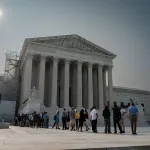Your trusted source for contextualizing abortion news. Sign up for our daily newsletter.
The Supreme Court has temporarily blocked heavy restrictions on the use of mifepristone, one of two drugs used for a medication abortion.
The decision, issued Friday, delays a ruling from a federal appeals court and will allow abortion providers to continue providing the drug as usual until at least 11:59 p.m. on Wednesday. Parties to the lawsuit have until noon Tuesday to file arguments with the high court.
The Supreme Court’s intervention allows physicians to continue using mifepristone for abortions past seven weeks and distributing the pill by mail and without an in-person visit to a doctor’s office. Mifepristone, when provided in conjunction with another drug called misoprostol, is about 99 percent effective in ending a pregnancy.
It’s a rare win for abortion rights at the high court, which overturned Roe v. Wade last summer. In that decision, the court’s conservative majority suggested that undoing Roe would allow states to decide questions of abortion rights, taking the issue out of the judiciary.
The mifepristone case, filed in a district court in Texas by a group of anti-abortion doctors, has little precedent. The doctors argued that the Food and Drug Administration acted too quickly when it approved mifepristone in 2000, and asked the courts to block the drug’s availability. The FDA took several years to approve mifepristone and there is a robust body of evidence showing its safety and effectiveness.
A week ago, Judge Matthew Kacsmaryk in Texas ruled in favor of the anti-abortion groups, holding that distribution of mifepristone should be blocked nationwide. The decision, which was robustly criticized by legal scholars and medical experts, would have taken effect this Friday. It was in conflict with another decision issued by a district judge in Washington state in a case brought by 17 states and Washington, D.C., seeking to expand mifepristone’s availability. Judge Thomas Rice said that the FDA could not change how it regulates the drug in the locales that had filed suit.
Following Kacsmaryk’s decision, the federal government sought relief from the U.S. Court of Appeals for the 5th Circuit. Late Wednesday night, that court partially blocked Kacsmaryk’s ruling, but said that instead, the FDA had to revert its approval of mifepristone to what was permitted in 2016: only allowing the drug to be used for people up to seven weeks of pregnancy, prohibiting its provision through telemedicine and requiring three in-person physician visits for anyone getting a prescription.
Currently, the FDA permits mifepristone to be used up to 10 weeks of pregnancy, and the World Health Organization recommends its use up to 12 weeks of pregnancy. Both endorse telemedicine for medication abortions.
Had the high court not stepped in, the appeals court decision would have taken effect Saturday, likely imposing the 2016 mifepristone regulations in all but the 17 states and jurisdictions affected by Rice’s decision.
Some doctors may have continued to provide mifepristone up to 10 weeks of pregnancy, which is called “off-label” prescription. But the reimposed telemedicine restrictions would likely have stymied access to this form of abortion, particularly in states where abortion remains legal but clinics have seen large influxes in out-of-state patients, stretching resources.
Danco, the company that manufactures branded mifepristone, said that to comply with the 5th Circuit decision, it would have had to change how its product is labeled and get providers newly certified to distribute the drug — a process that could take months. The company was unclear how it would comply with both the 5th Circuit’s ruling and Rice’s.
Mifepristone is not the only way to induce an abortion. Medication abortions can be performed with misoprostol only, using larger amounts of the drug. But that regimen is often more painful and, while still highly safe and effective, has a slightly higher failure rate than the two-drug combination.
Some abortion providers were considering dropping medication altogether if they could not provide mifepristone, completing abortions only through surgical means. Surgical abortions are also safe and effective, but fewer clinics provide them, and they can require more time and resources than a medication abortion.






